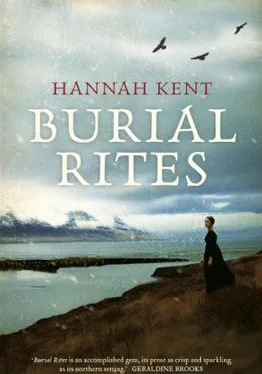‘Sigga seemed blind to the conniving character of the boy, though. That spring I noticed her dote on Fridrik, fetching him this and that as he worked outside and giggling at his stories of fist fights and daredevilry. In the evenings she’d often go out to the cowshed to bring him a little milk and wish him goodnight, and she’d take her time about it too. As I said, she’s a pretty little thing, and I expect Fridrik soon forgot brown-toothed Thórunn. He’s a keen rider, and used to flog his pony to death in an effort to impress Sigga. Even when that good horse threw him for the way he switched its hide all bloody, Sigga fetched him a supper and sat by his side as he wolfed it, sponging his swollen temple and stooping to kiss it better when she thought I could not see.
‘When Natan came back he saw that most of the ewes had given birth, and he praised us for doing the job so well. Sigga told him that we couldn’t have done it without Fridrik, and Natan asked us why in the Devil’s name we’d let that thieving boy upon the place when he wasn’t home to watch him. Sigga began to cry — she didn’t have the stomach for quarrels — and when Natan continued to rail at her for thoughtlessness, I stepped in and claimed it was my idea to fetch him.
‘I told Natan that I understood Illugastadir was not his only responsibility, but that without another man he could hardly expect Sigga and I to manage certain tasks. I told him that neither of us were strong enough to swing the lambs, and that we struggled to do a great many things besides. I told him that for all he had a grudge against Fridrik, that boy had saved a great number of his livestock, and we’d been careful not to let him sleep indoors. I didn’t tell him that Fridrik had been scratching in the front yard for money.
‘Eventually Natan calmed, and things returned to normal at Illugastadir. He said that he would ride to Geitaskard and hire Daníel Gudmundsson for harvest. He said that he wanted another man with us in his absence, but that he did not want it to be Fridrik.’
13th April 1828
RÓSA GUDMUNDSDÓTTIR FROM VATNSENDI was asked to appear at court. She declined to give any information about the case, but she said that Agnes came sometime that winter to her and spoke well about her master Natan. The baby that had been in foster care at Illugastadir is now at home with Rósa, being her daughter. She said that the baby is now three years old. She did not think that the baby had been harmed in any way by the murder, but remarked that the baby always says Natan is ‘up in the hills’. This is what the baby was told after the murder occurred. Rósa said that there is nothing unusual she can say about Agnes or Sigrídur as she doesn’t know them well. She said that Natan left Vatnsendi in the summer of 1825 after having stayed there with her and her husband for two years. She said that she knows Natan had at that point a considerable amount of money. She had taken 50 spesiurs from him for safekeeping.
The spring after Natan left, Fridrik from Katadalur came to Vatnsendi, and called her out for a private conversation in the cowshed. Rósa then said that he started to express how he desired her, and asked her to allow him to stay the night and come to her bed. She said that she rejected Fridrik, walked away from him and asked her husband not to allow him to stay inside even though he later requested it again. After that, she said her husband, Ólaf, came to her and told her that Fridrik had asked to see the storeroom so he could look for the money he thought Rósa kept for Natan. He said that Natan had told him he could take the money if he ever managed to sleep at Rósa’s place. Fridrik offered her husband two or four spesiurs and told Ólaf that his mother had had a dream where the money was stored under a barrel in the storeroom. Rósa said that she told her husband Natan’s stored money was absolutely not in the storeroom and Fridrik could look there for as long as he liked. After that her husband went out and, though she and her workmaid were sleeping, Fridrik went into the storeroom, ripped everything out of the barrel but didn’t find anything. She said he remarked that ‘his mother ought to dream better’. He said he had found a heavy object he couldn’t move, and was going to come back after he had received better information from his mother about where he should look. But he did not come back.
After this Fridrik was thought to hate Natan because he couldn’t find the money. Rósa said that she gave Natan the money she had stored for him the spring after Fridrik came, but said that she had not heard from him for a long time. She also remarked that while Natan lived with her he would often keep his money buried in the ground inside or outside the farm. No further evidence or information was possible to get from this woman, and she furthermore refused to confirm that what is recorded here is correct.
Anonymous clerk, 1828.
TÓTI WOKE IN THE UNLIT badstofa of Breidabólstadur, struggling to breathe. Pushing himself to a sitting position, he felt a feverish rush of blood to his head, and his arms trembled and gave way. He tried to cough; his tongue stuck to the roof of his mouth.
Across the room his father lay sleeping, his snores catching, his breath pausing for a few stricken seconds, then resuming in a rumbled exhalation. Why is he still sleeping, thought Tóti. It must be morning. I need a sip of water.
Fighting his light-headedness, Tóti tried to move his legs to the floor, setting his bare feet gently upon the boards. I must have had a nightmare, he thought, feeling his heart flutter in his chest. I’ll fetch some water.
The pantry air was deliciously cool on his clammy skin. Perhaps I ought to sleep in here, thought Tóti, sinking to the ground. It is so hot in the badstofa, someone has lit a fire beneath us.
He woke again at the touch of his father’s rough hands lifting him under his armpits.
‘Are you trying to catch yourself a cold? Sleepwalking like a madman.’
‘Mother?’
There was a pause. ‘No, son. It’s me.’
Reverend Jón stumbled back, and then managed to haul his son up against his side. ‘Now walk,’ he commanded, bending down to pick up his candle. ‘Are you still asleep?’
Tóti shook his head. ‘No, no. I’m not asleep. I felt queer and wanted some water. I think I drifted off there.’
He grasped his father’s offered arm and together they stumbled back to the badstofa. ‘Sit yourself down on your bed now,’ his father said. He took a few steps back, watching as Tóti swayed uneasily on his feet. His eyes were unusually bright, his hair slick with sweat in the candlelight.
‘You’ve exhausted yourself, son. It’s all your travelling to Kornsá in this unfit weather. It’s addled you.’
Tóti looked up at him. ‘Father?’
Reverend Jón caught him as he fell.

THE DAYS ARE DWINDLING NOW. There is time enough for everything; too much time, and so the family of Kornsá have gone to church to kill the miserable hours that creak about on a Sunday morning. The mountains are covered in snow and the water in the cowshed iced over last night. Jón sent Bjarni out to crack it with a hammer, and now it is just we three, Bjarni, Jón and me, waiting until the others return.
I wonder where the Reverend is? I have not seen him in many days. I thought he might come for my birthday, seeing as he knew of it from the ministerial book, but the day came and went and I dared not say anything to the family. The November days are now crawling past, and still he does not come, with no letter, no message to sustain me. Steina asked me if I thought the weather might be keeping him away: there was a blizzard a week ago that almost snowed us in. Perhaps he is too taken up by pastoral duties, and is travelling around his own parish with the soul registers, writing countless names down so that history will not forget them. Or perhaps he has had enough of my stories; perhaps I have said something and he is now convinced I am guilty, that I must be abandoned and punished. I am too godless. I am distracting him from his dedication to Christian thinking. I make him doubt his belief in a loving Lord. Perhaps Blöndal has summoned him again, told him to stop listening to me. Either way, it seems cruel to leave me without warning, without an assurance that he’ll come back. Without his visits the days seem longer, even as the light flees this country like a whipped dog. I’ve less and less to do, and the waiting for him keeps me on a knife-edge. Every boot knocking off snow, every cough in the corridor makes me think he has come again. But it is never him. Only the servants, returning from feeding the stock in the evenings. Only Margrét, spitting into her handkerchief.
Читать дальше











